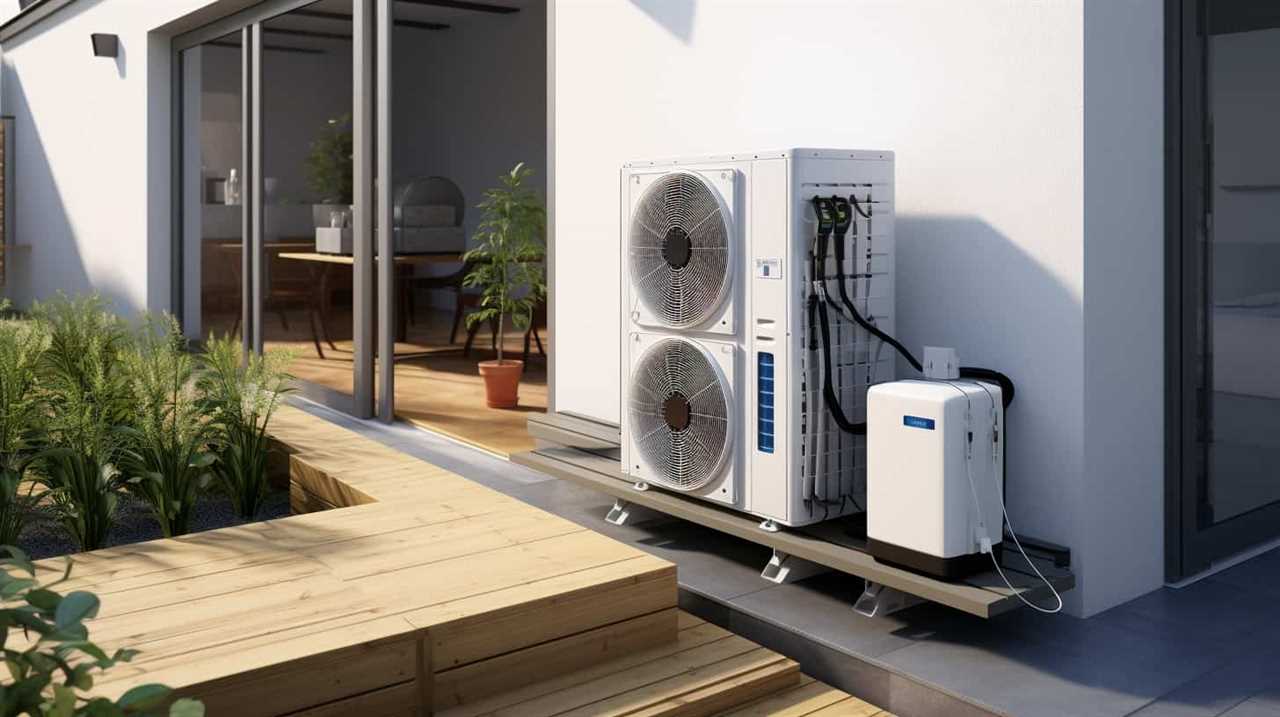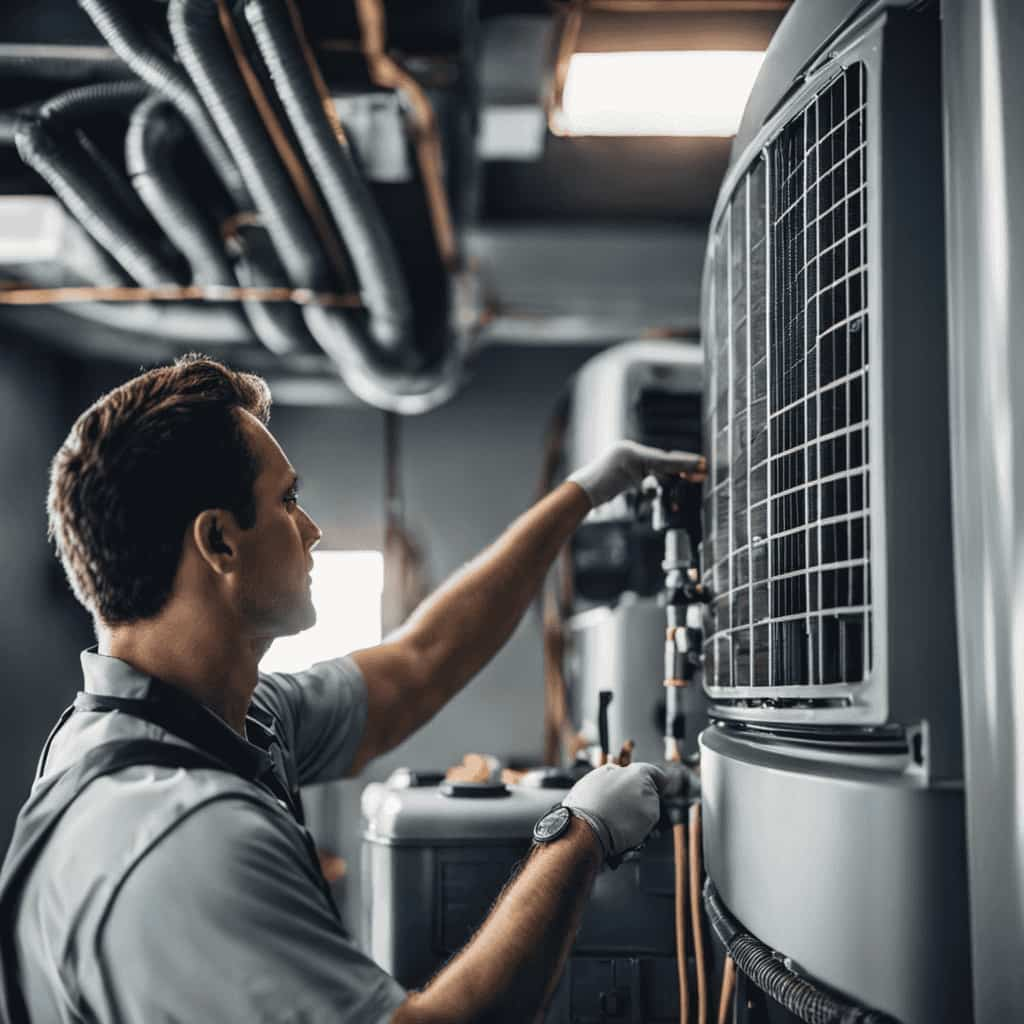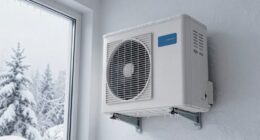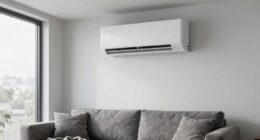Welcome to our guide on cost-effective heat pump heating solutions for homes! We aim to assist you in understanding the advantages and operation of this efficient and budget-friendly heating system.
From understanding how heat pumps work to choosing the right one for your home, we’ve got you covered.
Discover the benefits of heat pump home heating and learn about installation, energy efficiency, and maintenance.
Let us be your trusted source for all things heat pump, as we strive to serve you in the best possible way.

Key Takeaways
- Heat pumps are an energy-efficient and cost-saving option for home heating.
- There are different types of heat pumps available, including air source, ground source, and water source, each with its own advantages and considerations.
- Factors to consider when choosing a heat pump include size, efficiency, noise level, aesthetic appeal, and maintenance requirements.
- Professional installation, regular maintenance, and filter cleaning are essential for optimal performance and longevity of the heat pump.
How Do Heat Pumps Work
How do heat pumps work?
Heat pump technology is based on the principle of transferring heat from one place to another using a small amount of electrical energy. Heat pumps operate by extracting heat from the outdoor air or ground and transferring it to the inside of a building for heating purposes.
This process is achieved through the use of a refrigerant that circulates within the heat pump system. The refrigerant absorbs heat from the outdoor environment, allowing it to transition from a liquid to a gas state. The gas is then compressed, which increases its temperature even further. Finally, the heat is released inside the building, providing comfortable warmth.
This efficient heat pump operation makes it a cost-effective and eco-friendly solution for home heating.

Now, let’s explore the different types of heat pumps for home heating.
Types of Heat Pumps for Home Heating
There are three main types of heat pumps for home heating: air source, ground source, and water source. Each type has its own advantages and disadvantages, so it’s important to choose the right one for your specific needs.
| Type | Advantages | Disadvantages |
|---|---|---|
| Air Source | – Easy installation | – Lower efficiency in extreme cold temperatures |
| – Lower upfront cost | – Can be noisy | |
| – Suitable for small to medium-sized homes | ||
| ————– | ————————————– | ————————————————– |
| Ground Source | – High efficiency | – Higher upfront cost |
| – Suitable for all climates | – Requires more space for installation | |
| – Quiet operation | ||
| ————– | ————————————– | ————————————————– |
| Water Source | – High efficiency | – Limited availability of water sources |
| – Suitable for large homes and commercial buildings | ||
| – Long lifespan |
Choosing the right type of heat pump depends on factors such as the climate in your area, the size of your home, and your budget. Now let’s explore the benefits of heat pump home heating.
BENEFITS OF HEAT PUMP HOME HEATING
Benefits of Heat Pump Home Heating
When it comes to home heating, heat pumps offer several benefits that make them a popular choice among homeowners.
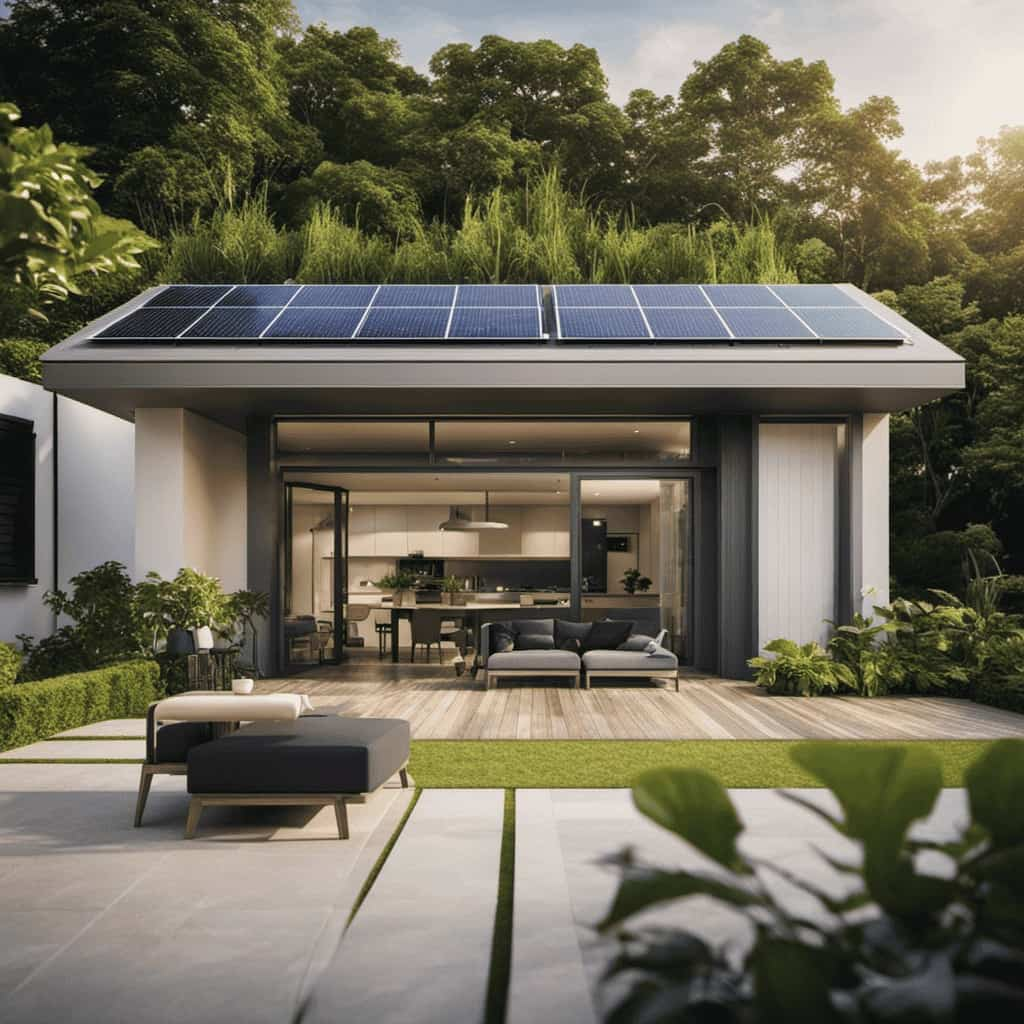
One of the key advantages is their energy efficiency, as heat pumps can produce more heat energy than the electricity they consume.
This not only helps reduce energy consumption but also lowers heating costs, making it a cost-saving option for homeowners.
Energy-Efficient Heating Solution
We can enjoy numerous benefits by choosing a heat pump as our energy-efficient heating solution. Heat pumps are an excellent example of energy-efficient technology, as they can significantly reduce our carbon footprint. Here are four key benefits of heat pump home heating:
-
Energy savings: Heat pumps are highly efficient in converting electricity into heat, resulting in lower energy consumption and reduced utility bills.
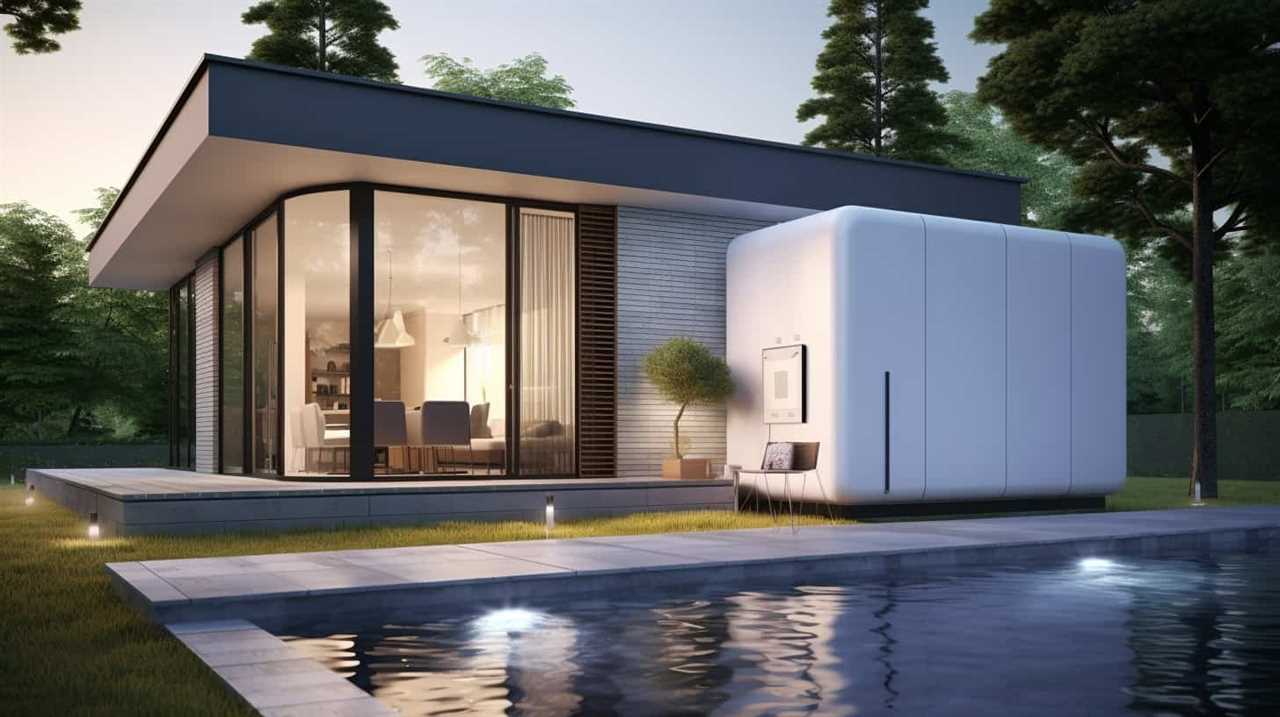
-
Environmental friendliness: By using renewable energy sources, such as the heat from the air or ground, heat pumps produce fewer greenhouse gas emissions compared to traditional heating systems.
-
Consistent comfort: Heat pumps provide both heating and cooling capabilities, ensuring year-round comfort in our homes.
-
Long-term cost savings: Although the initial installation cost may be higher, heat pumps offer long-term savings through reduced energy consumption and lower maintenance requirements.
Cost-Saving Heating Option
One of the benefits of choosing a heat pump as our cost-saving heating option is the potential for long-term energy savings.
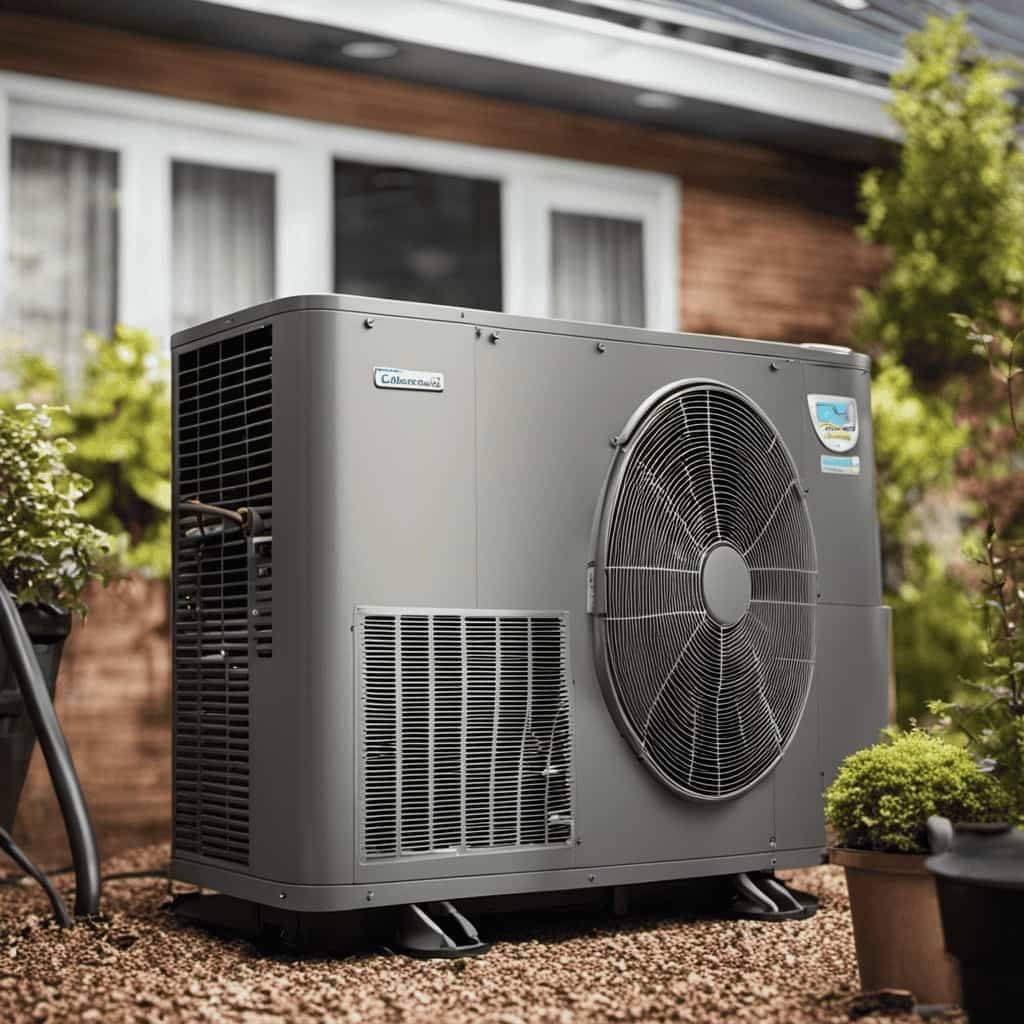
Heat pumps are known for their high efficiency and ability to transfer heat from one place to another, rather than generating it through combustion. This makes them a cost-effective heating solution, as they require less energy to operate compared to traditional heating systems.
Heat pumps use electricity to extract heat from the air, ground, or water and transfer it indoors. By utilizing energy-saving technology, heat pumps can provide efficient heating while reducing energy consumption and lowering utility bills.
Additionally, heat pumps can also be used for cooling during the summer months, offering year-round comfort and further enhancing their value as energy-saving solutions.
Factors to Consider When Choosing a Heat Pump
There are four important factors to consider when choosing a heat pump for your home. These factors will help you make an informed decision and ensure that you select the right heat pump for your needs.

-
Size: It’s crucial to choose the right size of heat pump for your home. A heat pump that’s too small will struggle to heat your home efficiently, while one that’s too large will consume more energy than necessary.
-
Efficiency: Look for a heat pump with a high efficiency rating. This will ensure that you get the most out of your heating system while keeping energy costs low.
-
Installation Process: Consider the complexity of the installation process. Some heat pumps may require additional modifications to your home’s existing heating system, which could increase the overall cost and time required.
-
Cost: Finally, take into account the overall cost of the heat pump, including installation, maintenance, and operation. While it may be tempting to choose the cheapest option, it’s important to consider the long-term savings and efficiency of the heat pump.

Installing a Heat Pump: What You Need to Know
When installing a heat pump, it’s important to understand the necessary steps and considerations. To ensure a successful installation, here are some heat pump installation tips to keep in mind.
-
First, it’s crucial to find the right heat pump for your home. Consider factors such as the size of your space, climate conditions, and energy efficiency ratings. Look for a heat pump that’s properly sized to provide optimal heating and cooling.
-
It’s also essential to hire a professional HVAC technician for the installation process. They’ve the experience and expertise to properly install the heat pump and ensure it functions efficiently.
-
Additionally, make sure to follow the manufacturer’s instructions and guidelines for installation. Proper installation won’t only maximize the performance of your heat pump but also extend its lifespan.

Energy Efficiency and Cost Savings With Heat Pumps
When it comes to heat pumps, there are several key points to consider: lower energy bills, environmental friendliness, and long-term cost savings.
Heat pumps are highly energy efficient, meaning they use less energy to produce the same amount of heat compared to traditional heating systems. This translates to lower energy bills and reduced carbon emissions, making heat pumps an environmentally friendly option.
Additionally, while the upfront cost of installing a heat pump may be higher, the long-term cost savings from lower energy bills can outweigh the initial investment.
Lower Energy Bills
We usually experience lower energy bills when we use heat pumps due to their energy efficiency and cost-saving features. Here are some energy saving tips and affordable home insulation options that can further help reduce your energy bills:
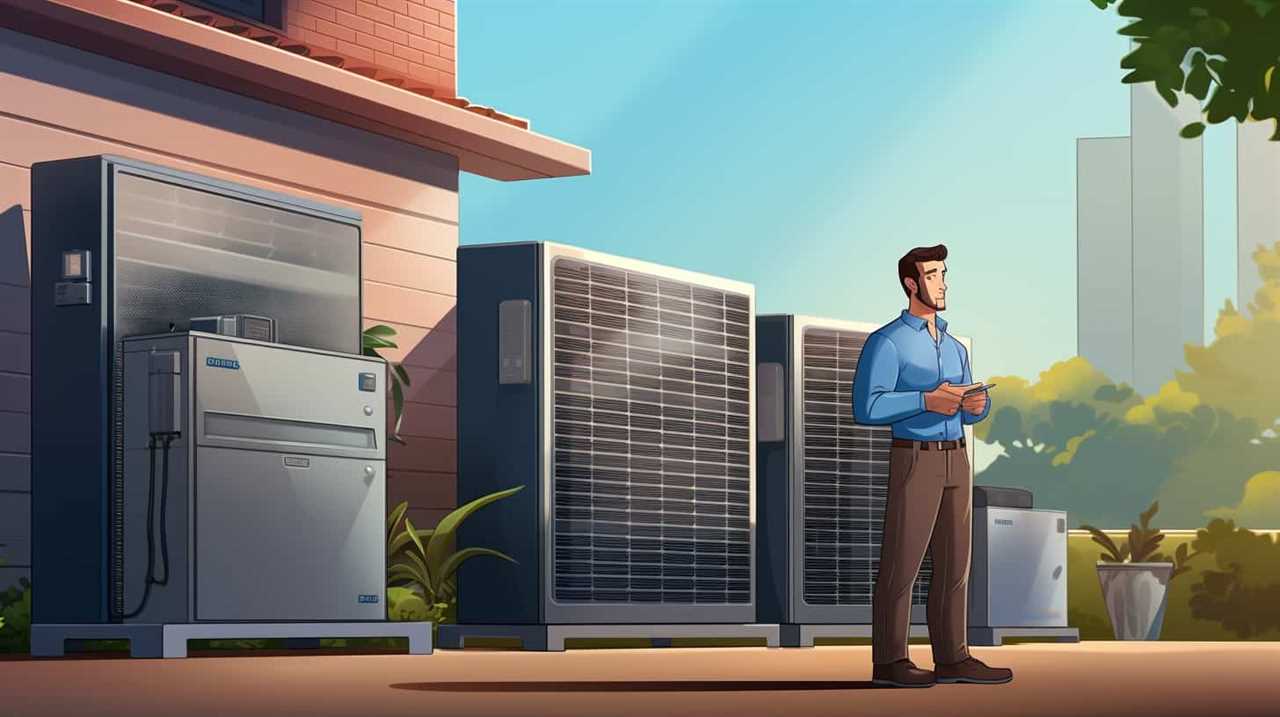
-
Proper insulation: Ensure your home is well-insulated to prevent heat loss and improve energy efficiency. Consider adding insulation to your walls, attic, and floors.
-
Air sealing: Seal any gaps or cracks in your windows, doors, and walls to prevent drafts and heat loss. This will help your heat pump operate more efficiently.
-
Programmable thermostat: Install a programmable thermostat to control and optimize your heat pump’s temperature settings based on your schedule. This can lead to significant energy savings.
-
Regular maintenance: Schedule regular maintenance for your heat pump to ensure optimal performance and energy efficiency.
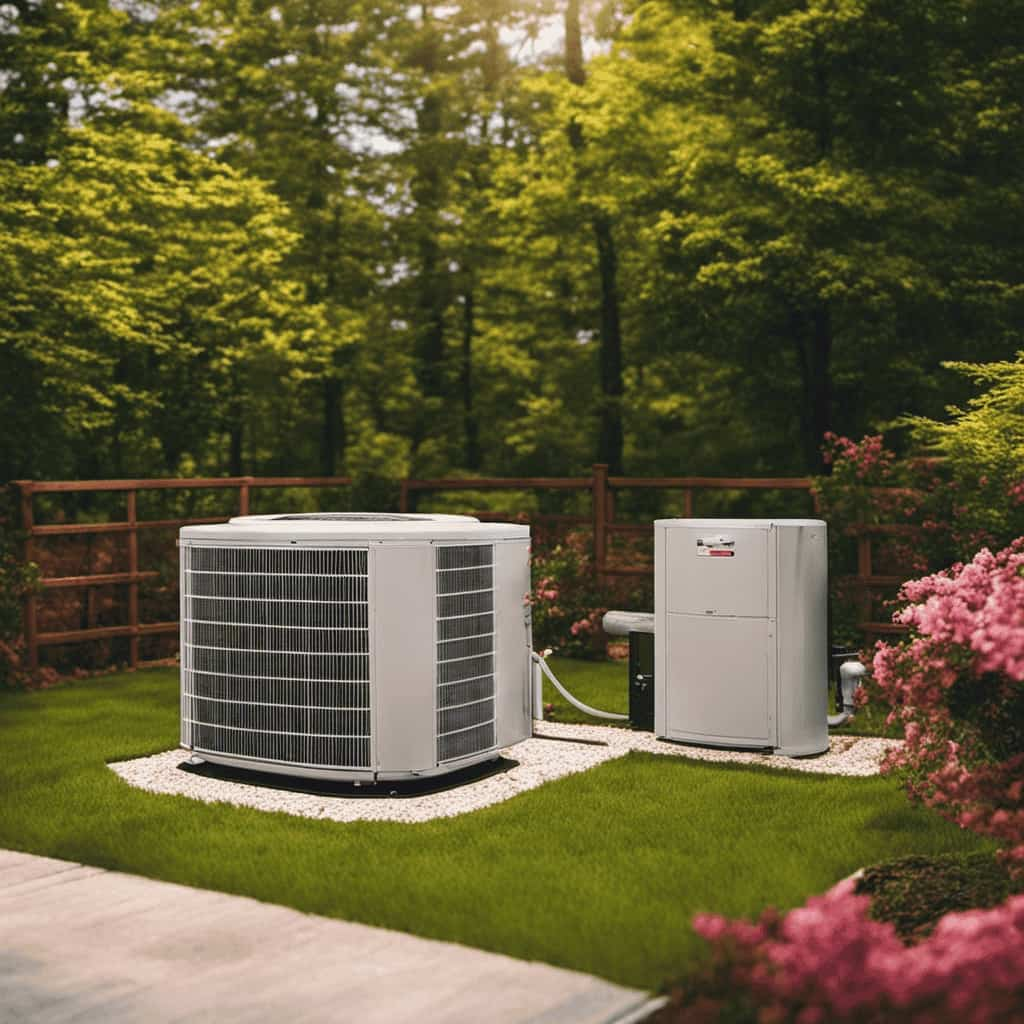
By implementing these energy saving tips and investing in affordable home insulation, you can further reduce your energy bills while enjoying the benefits of heat pump home heating.
Now, let’s discuss the environmentally friendly option of heat pumps.
Environmentally Friendly Option
An environmentally friendly option for home heating is to use heat pumps, which offer energy efficiency and cost savings.
Heat pumps are a renewable energy source that can significantly reduce the environmental impact associated with traditional heating systems. Unlike combustion-based heating systems that rely on fossil fuels, heat pumps work by transferring heat from one place to another, using a small amount of electricity to operate. This process makes them highly efficient, as they can deliver more energy than they consume.
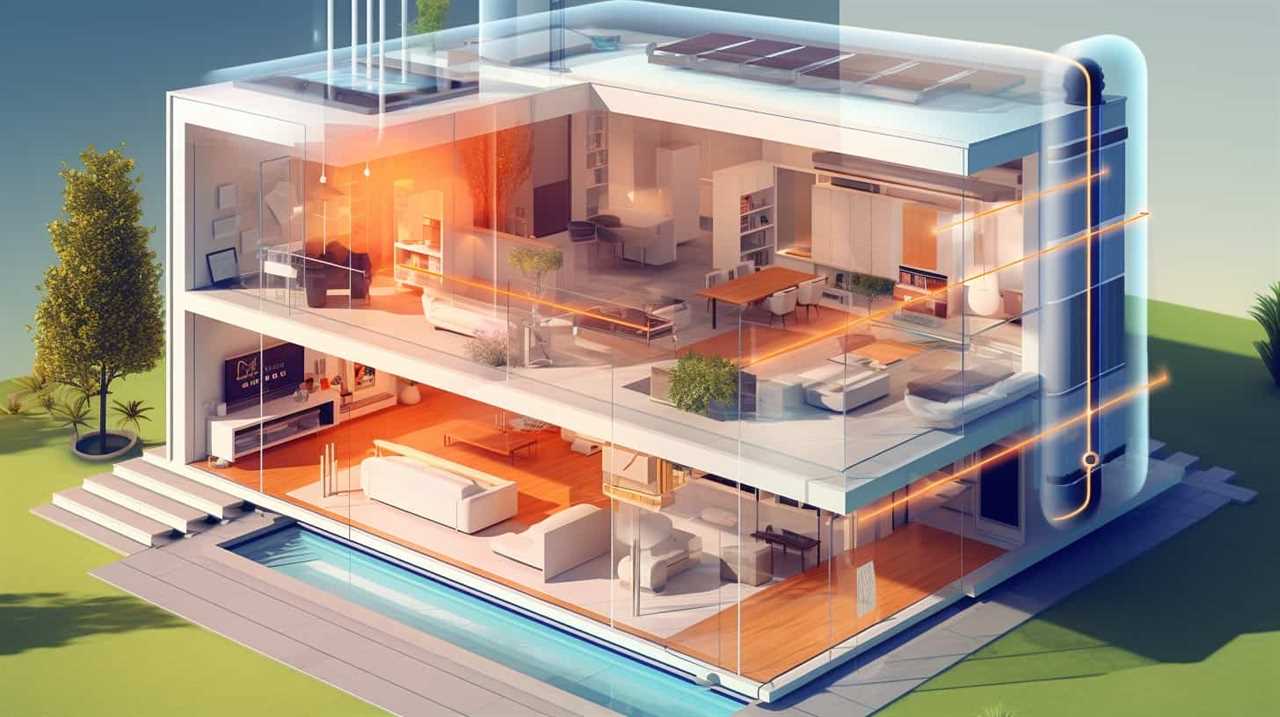
By harnessing the natural heat in the air or ground, heat pumps provide a sustainable and low-carbon alternative for heating homes.
Additionally, heat pumps can save homeowners money on their energy bills, as they require less energy to operate compared to conventional heating systems.
Long-Term Cost Savings
By maximizing energy efficiency and providing long-term cost savings, heat pumps are an ideal choice for home heating. Here are four reasons why heat pumps offer significant cost savings:
-
Energy Efficient Appliances: Heat pumps are highly energy efficient, converting a small amount of electrical energy into a larger amount of heat energy. This means they consume less energy compared to traditional heating systems, resulting in lower utility bills.
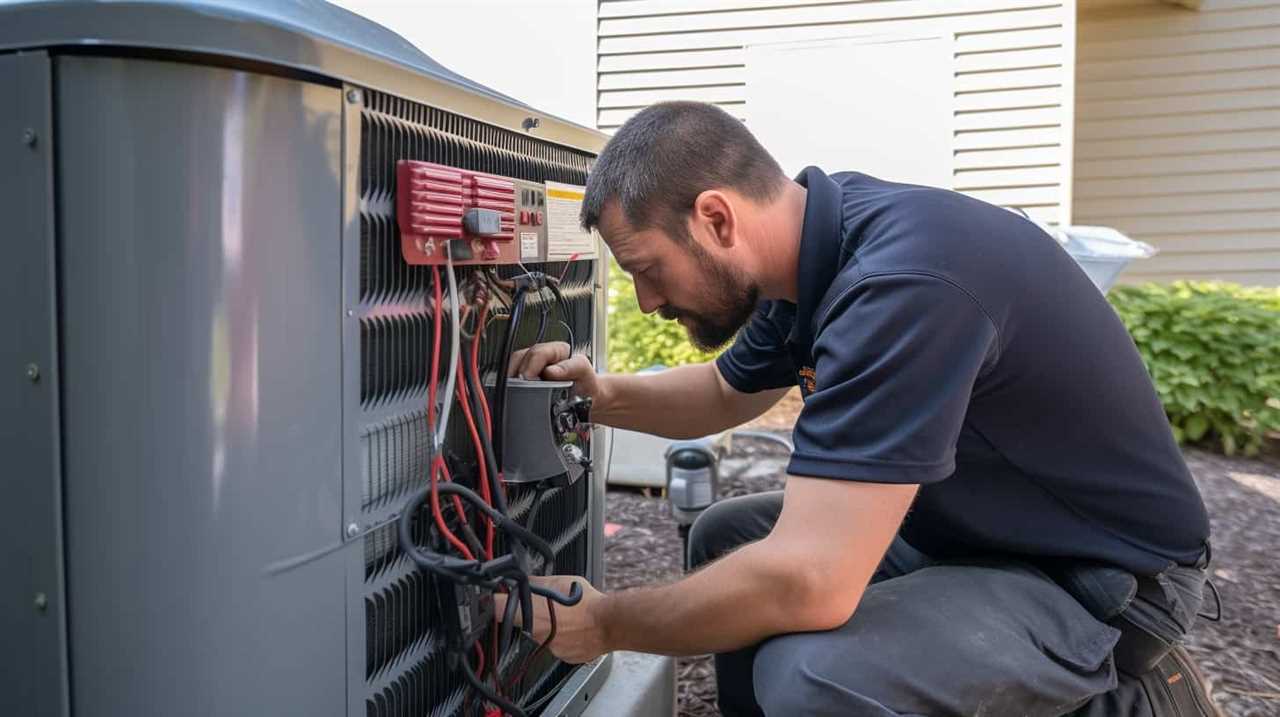
-
Reduced Heating Costs: Heat pumps utilize the heat from the outside air or ground, which is a free and renewable energy source. By harnessing this heat, heat pumps can provide consistent heating at a fraction of the cost of other heating systems.
-
Lower Maintenance Expenses: Heat pumps have fewer moving parts compared to combustion-based heating systems, resulting in lower maintenance and repair costs over time.
-
Insulation Techniques: To maximize the efficiency of heat pumps, it’s crucial to have proper insulation in your home. By insulating walls, floors, and ceilings, you can reduce heat loss and ensure that the heat pump operates optimally, leading to further cost savings.
Investing in a heat pump and implementing insulation techniques can provide significant long-term cost savings while keeping your home warm and comfortable.

Maintaining and Troubleshooting Your Heat Pump
Regularly maintaining and troubleshooting your heat pump is essential for optimal performance and energy efficiency. To keep your heat pump operating at its best, here are some maintaining tips to follow.
- First, make sure to regularly clean or replace the air filters. Dirty filters restrict airflow and reduce the system’s efficiency.
- Second, keep the outdoor unit clear of debris, such as leaves and branches, to prevent airflow obstruction.
- Third, inspect and clean the coils annually to remove any dirt buildup.
- Lastly, schedule professional maintenance at least once a year to ensure all components are functioning correctly.
Despite regular maintenance, common issues can still arise with heat pumps. One common issue is a refrigerant leak, which can cause reduced heating or cooling capacity. Another issue is a frozen evaporator coil, usually caused by restricted airflow or low refrigerant levels. Additionally, electrical problems, such as blown fuses or faulty wiring, can affect the heat pump’s operation.
If you encounter any of these issues, it’s recommended to contact a qualified technician for troubleshooting and repairs. Remember, proper maintenance and timely troubleshooting can help prolong the lifespan of your heat pump and keep it running efficiently.
Comparing Heat Pumps to Other Heating Systems
The heat pump offers several advantages over traditional heating systems. Here are four reasons why a heat pump may be a better choice compared to other heating systems:

-
Energy Efficiency: Heat pumps are incredibly energy efficient, providing up to three times more heating power compared to the electricity they consume. This makes them a cost-effective option for long-term use.
-
Versatility: Heat pumps can be used for both heating and cooling, eliminating the need for separate systems. This versatility allows homeowners to save money on installation, maintenance, and energy bills.
-
Environmental Friendliness: Heat pumps produce fewer greenhouse gas emissions compared to traditional furnaces, making them a greener option. By using renewable energy sources, such as air or ground heat, heat pumps contribute to a more sustainable future.
-
Consistent Comfort: Heat pumps provide consistent heating throughout your home, without the uneven temperatures that electric heaters often produce. This ensures a comfortable living environment for you and your family.

Frequently Asked Questions
Can a Heat Pump Be Used for Both Heating and Cooling Purposes?
Yes, a heat pump can be used for both heating and cooling purposes. It is an efficient system that provides the benefits of heating in the winter and cooling in the summer.
Are Heat Pumps Noisy When in Operation?
Heat pump noise levels vary depending on the model and installation. To reduce noise, consider locating the heat pump away from living areas, using sound barriers, and regular maintenance to ensure proper functioning.
How Long Does a Heat Pump Typically Last Before Needing to Be Replaced?
Heat pumps typically last around 15-20 years before needing replacement. Regular heat pump maintenance, such as cleaning the coils and filters, can extend their lifespan. Signs of a failing heat pump include reduced heating or cooling capacity and frequent breakdowns.
Can a Heat Pump Be Installed in Any Type of Home, or Are There Specific Requirements?
Yes, there are specific requirements for heat pump installation. Factors like home size, insulation, and existing heating system affect compatibility. A professional assessment is needed to determine if a heat pump can be installed in any type of home.
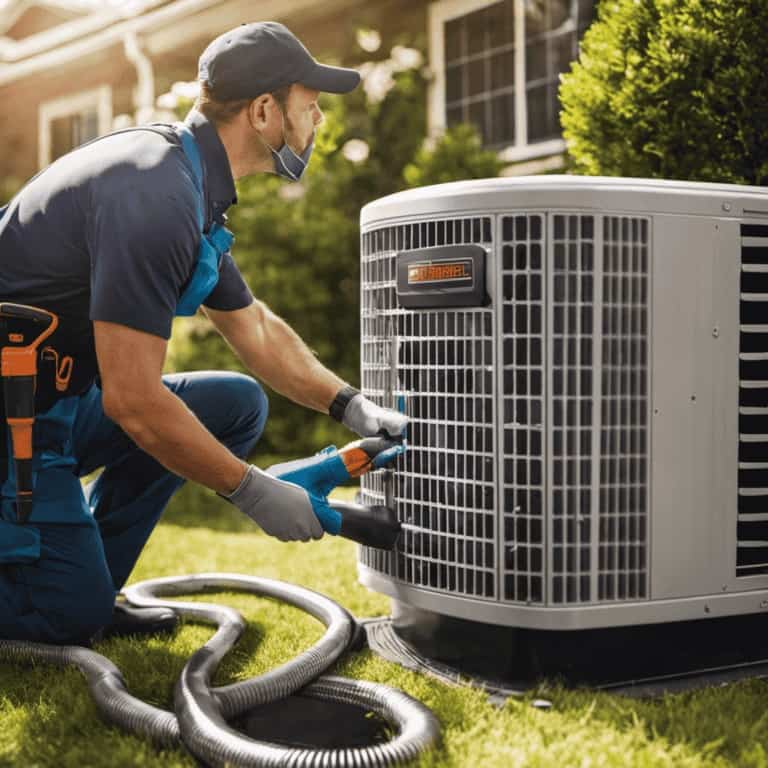
Are There Any Government Incentives or Rebates Available for Installing a Heat Pump in My Home?
There are government incentives and energy rebates available for installing a heat pump in our home. These incentives vary depending on location and can greatly help offset the cost of installation and operation.
Conclusion
In conclusion, heat pumps offer an affordable and efficient solution for home heating. With their ability to transfer heat from the outside air or ground, they provide consistent warmth throughout the year.
By choosing the right type of heat pump and considering factors such as size, energy efficiency, and maintenance, homeowners can enjoy the benefits of cost savings and environmental friendliness.
So, when it comes to heating your home, consider the reliable and versatile option of a heat pump.
